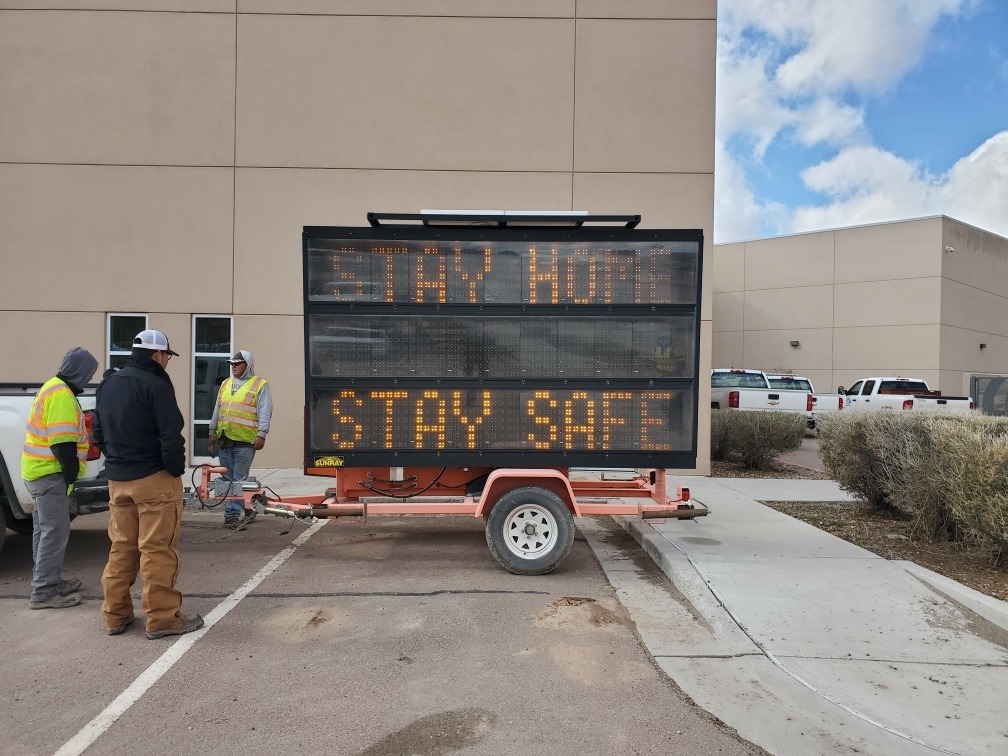
- Details
- By Native News Online Staff
WINDOW ROCK, Ariz. — On Monday, the Navajo Department of Health, in coordination with the Navajo Epidemiology Center and the Navajo Area Indian Health Service, reported 74 new COVID-19 positive cases for the Navajo Nation and no new deaths. The total number of deaths remains at 378 as previously reported.
Reports from all 12 health care facilities on and near the Navajo Nation indicate that approximately 5,604 individuals have recovered from COVID-19. 59,205 people have been tested for COVID-19. The total number of COVID-19 positive cases for the Navajo Nation is 7,914.
Navajo Nation COVID-19 positive cases by Service Unit:
- Chinle Service Unit: 1,996
- Crownpoint Service Unit: 680
- Ft. Defiance Service Unit: 497
- Gallup Service Unit: 1,319
- Kayenta Service Unit: 1,134
- Shiprock Service Unit: 1,272
- Tuba City Service Unit: 703
- Winslow Service Unit: 309
*Four residences with COVID-19 positive cases are not specific enough to place them accurately in a Service Unit.
On Sunday, the Navajo Department of Health issued Public Health Emergency Order 2020-017, a Stay at Home (Shelter in Place) order that requires all individuals on the Navajo Nation to stay at home and strictly limit movement within and outside of their immediate communities, and limit public contact with others. Individuals may leave their place of residence only for emergencies or to perform “Essential Activities.” All residents are also required to avoid close contact with people who are sick, wash your hands for 20 seconds often, avoid touching high-touch surfaces, wear a mask, clean and disinfect your home, avoid public gatherings, and avoid non-essential travel.
“The Navajo Nation has had a stay-at-home order in place since the pandemic began in March, but with the latest public health emergency order we are clarifying and adding new language based on everything we have learned over the last few months. The orders that are in effect are based on the advice and input of our Nation’s health care experts. It’s very important that everyone adhere to these provisions in order to keep yourselves and your families safe from the coronavirus. There is still plenty that we don’t know and we don’t expect to have a vaccine for quite some time,” said Navajo Nation President Jonathan Nez.
The order also states that all individuals on the Navajo Nation shall comply with the following consistent with the current Public Health Emergency Orders:
- Daily curfew from 8:00 p.m. to 5:00 a.m. (from Public Health Emergency Order No. 2020-013 (June 5, 2020)). Weekend Curfews or Lockdowns, as may be ordered.
- Wear a mask in public (from Public Health Emergency Order No. 2020-007 (April 17, 2020)
- Avoid public gatherings of more than 5 people. “Drive-In” gatherings are permissible during non-curfew hours (from Public Health Emergency Order No. 2020-14 (June 5, 2020)
- Remain in your vehicle for curb-side and drive-through essential activities.
To Donate to the Navajo Nation
The official webpage for donations to the Navajo Nation, which has further details on how to support the Nation’s Dikos Ntsaaígíí-19 (COVID-19) efforts is: http://www.nndoh.org/donate.html.
For More Information
For more information including reports, helpful prevention tips, and more resources, please visit the Navajo Department of Health’s COVID-19 website at https://www.google.com/url?q=http://www.ndoh.navajo-nsn.gov/COVID-19&source=gmail&ust=1587083371421000&usg=AFQjCNElmEp0sigTX1ogQLQERk412ZP_JA" style="margin: 0px; padding: 0px; border: 0px; font: inherit; vertical-align: baseline; text-decoration: none; color: rgb(237, 28, 47); transition: background-color 0s ease 0s, color 0.2s linear 0s;">http://www.ndoh.navajo-nsn.
For up to date information on impact the coronavirus pandemic is having in the United States and around the world go to:https://www.worldometers.info/coronavirus/country/us/?fbclid=IwAR1vxfcHfMBnmTFm6hBICQcdbV5aRnMimeP3hVYHdlxJtFWdKF80VV8iHgE
More Stories Like This
New Mexico Will Investigate Forced Sterilization of Native American WomenUSDA Expands Aid for Lost Farming Revenue Due to 2025 Policies
Two Feathers Native American Family Services Wins 2026 Irvine Leadership Award
Bill Would Give Federal Marshals Authority to Help Tribes Find Missing Children
Indian Health Service to Phase Out Mercury-Containing Dental Amalgam by 2027

